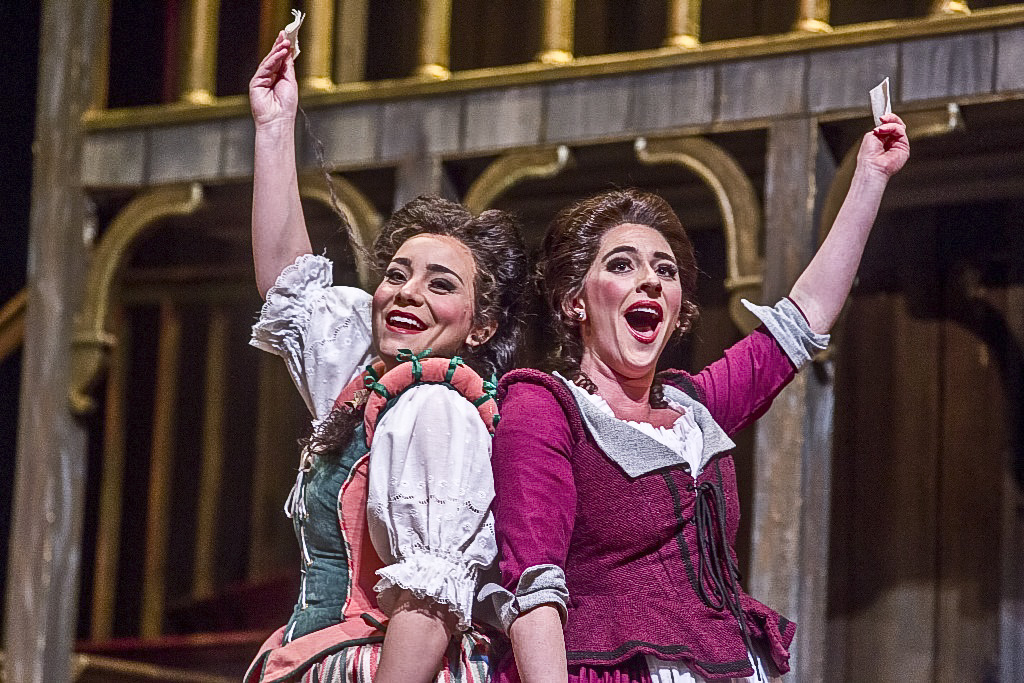The Lamont School of Music’s production of “The Merry Wives of Windsor,” directed by Professor Kenneth Cox, opened April 16 and ran one weekend.
While an opera can sometimes be rather daunting to attend, “Merry Wives” is a great introduction due to its abundant comedy, the spoken dialogue in between musical numbers and its shift from the original German to English.
This production had two sets of lead actors, one performing on Thursday and Saturday and the other on Friday and Sunday.
Based on Shakespeare’s play of the same name, Otto Nicolai’s sole masterpiece “Merry Wives” follows Mrs. Page (Sonora Dolce and Jovahnna Anderson) and Mrs. Ford (Emily Gradowski and Lisa Tenorio), who plot playful revenge on Sir John Falstaff (Griffen Hogan Tracy and Michael Hewitt), “the fat knight,” who sent love letters to both women. They are outraged due to their married status and each pretend to be in love with Falstaff, tricking him during a series of encounters while also deceiving jealous Mr. Ford (Welly Disayanon and Jared Giammanco) along the way. Mr. Page (Rocco McKeel and Zeky Nadji) and the neighbors are won over by the wives’ tall tales.
Meanwhile, Anne Page (Heidi McAuley and Victoria Minton), who is in love with the penniless Fenton (Kevin Gwinn and Leo Kaufman), must ward off two ridiculous suitors, the pompous Frenchman Dr. Cajus (Kasey Nahlovsky) and the meek, lisping Slender (Nathan Crowder).
The opera ends in the most Shakespearean way possible—a masquerade, complete with a mistaken identity and revealed qualities of character.
The Lamont Symphony Orchestra (conducted by Professor Lawrence Golan) offered an outstanding interpretation of Nicolai’s one-hit-wonder score, with lively swells setting the stage for the fusion of Romantic and comic styles. Oboe and violin solos beautifully intertwined with the melodies of the singers throughout the various arias.
In Friday’s production, Tenorio and Anderson shone as the two mischievous wives, each sporting impressive range and tone. Both made use of quirky expressions and inflection to infuse sly jest into their characters, even through singing their highest notes.
Nahlovsky and Crowder played Anne’s suitors at a perfectly outrageous, over-the-top level that kept the audience in stitches.
One particular scene had Fenton (Kaufman) singing dramatically to Anne while Slender and Dr. Cajus hid behind laughably narrow bushes. The audience spent more time snickering at the facial expressions and flailing on behalf of the suitors than following Fenton and Anne’s lovesick melody.
Similarly, Hewitt’s Falstaff, who wore a pillow-like fat suit in typical Shakespearean fashion, played up the boisterous slapstick that kept the audience entertained during more repetitive parts of the songs. The theatrical, operatic style only fueled the absurd nature of the character.
The Lamont School of Music never fails to impress, and their operas are no exception. The style may take a little getting used to, but, with a comedic story that still translates to modern audiences, these shows are worth snagging a ticket.
To satisfy any musical needs in the meantime, the Lamont Symphony Orchestra’s next concert is Tuesday, April 28 at 7:30 p.m. Tickets are available through the box office. They are free for students and staff.











